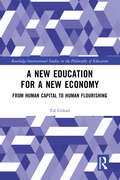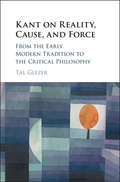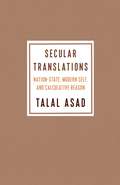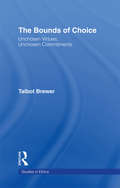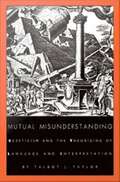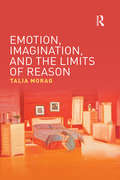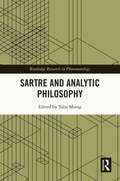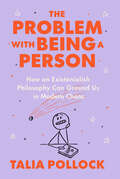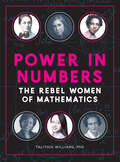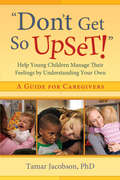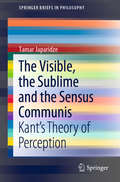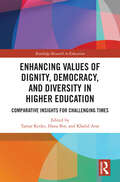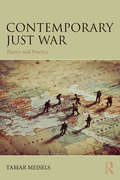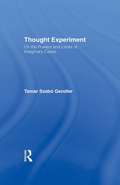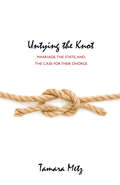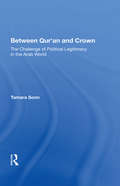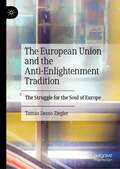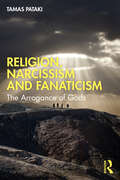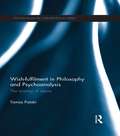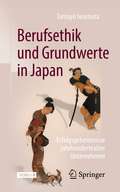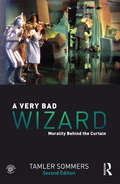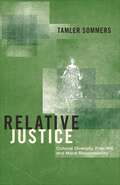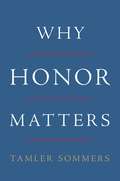- Table View
- List View
A New Education for a New Economy: From Human Capital to Human Flourishing (Routledge International Studies in the Philosophy of Education)
by Tal GileadProviding an in-depth, novel analysis of education’s role in today’s economy by scrutinizing its theoretical underpinnings, this volume critiques the suitability of the current, dominant economic framework for education and for shaping educational policymaking worldwide.Critically examining the history and philosophy that underpin our present societal understanding of the link between economics and education, the book argues for an urgent redefining of education’s role in the economy based on intellectual foundations that significantly differ from our current, dominant conceptions. Across seven chapters, the book posits that the adoption of a new philosophical framework, the reshaping of economic and educational aims, and the adjustment of our educational system are each necessary to better promote human flourishing.Ultimately providing a platform to entirely reconsider the idea that the primary aim of education is to serve the economic system – in particular, economic growth – this book will appeal to scholars, researchers, and postgraduate students studying educational policy, the philosophy of education, and the history of education more broadly. Education policymakers and academics studying education and the economy may also find this book of interest.
Kant on Reality, Cause, and Force: From the Early Modern Tradition to the Critical Philosophy
by Tal GlezerKant's category of reality is an often overlooked element of his Critique of Pure Reason. Tal Glezer shows that it nevertheless belongs at the core of Kant's mature critical philosophy: it captures an issue that motivated his critical turn, shaped his theory of causation, and established the role of his philosophy of science. Glezer's study traces the roots of Kant's category of reality to early modern debates over the intelligibility of substantial forms, fueled by the tension between the idea of non-extended substances and that of extended objects. This tension influenced Kant's pre-critical work, and eventually inspired his radical break towards transcendental idealism. Glezer explores the importance of reality for Kant's conceptions of cause and force, and sheds new light on his philosophy of physical science, including gravity. His book will interest scholars of Kant and of early modern philosophy, as well as historians of scientific ideas. Presents an original perspective on Kant's category of reality and its relationship with the concepts of cause and force, exploring a commonly neglected topic. Discusses the link between Kant's major work, the Critique of Pure Reason, and his philosophy of science, described in the Metaphysical Foundations of Natural Science. Includes extended discussion of early modern thought, tracing the roots and development of Kant's concept of reality.
Secular Translations: Nation-State, Modern Self, and Calculative Reason (Ruth Benedict Book Series)
by Talal AsadIn Secular Translations, the anthropologist Talal Asad reflects on his lifelong engagement with secularism and its contradictions. He draws out the ambiguities in our concepts of the religious and the secular through a rich consideration of translatability and untranslatability, exploring the circuitous movements of ideas between histories and cultures.In search of meeting points between the language of Islam and the language of secular reason, Asad gives particular importance to the translations of religious ideas into nonreligious ones. He discusses the claim that liberal conceptions of equality represent earlier Christian ideas translated into secularism; explores the ways that the language and practice of religious ritual play an important but radically transformed role as they are translated into modern life; and considers the history of the idea of the self and its centrality to the project of the secular state. Secularism is not only an abstract principle that modern liberal democratic states espouse, he argues, but also a range of sensibilities. The shifting vocabularies associated with each of these sensibilities are fundamentally intertwined with different ways of life. In exploring these entanglements, Asad shows how translation opens the door for—or requires—the utter transformation of the translated. Drawing on a diverse set of thinkers ranging from al-Ghazālī to Walter Benjamin, Secular Translations points toward new possibilities for intercultural communication, seeking a language for our time beyond the language of the state.
The Bounds of Choice: Unchosen Virtues, Unchosen Commitments (Studies in Ethics)
by Talbot BrewerPresents a sustained and original challenge to the orthodox understanding of the relationship between morality and voluntary choice. The two main theses of the book are that we can be morally responsible for aspects of our character that we have not chosen or otherwise authored, and that we can enter into interpersonal commitments to which we have not voluntarily consented.
Mutual Misunderstanding: Scepticism and the Theorizing of Language and Interpretation
by Talbot J. TaylorDo others understand what we say or write? Do we understand them? Theorists of language and interpretation claim to be more concerned with questions about "what" we understand and "how" we understand, rather than with the logically prior question "whether" we understand each other. An affirmative answer to the latter question is apparently taken for granted. However, in Mutual Misunderstanding, Talbot J. Taylor shows that the sceptical doubts about communicational understanding do in fact have a profoundly important, if as yet unacknowledged, function in the construction of theories of language and interpretation. Mutual Misundertanding thus presents a strikingly original analysis of the rhetorical patterns underlying Western linguistic thought, as exemplified in the works of John Locke, Jacques Derrida, Gottlob Frege, Jonathan Culler, Noam Chomsky, Ferdinand de Saussure, H. Paul Grice, Michael Dummet, Stanley Fish, Alfred Schutz, Barbara Herrnstein Smith, Harold Garfinkel, and others. This analysis reveals how, by the combined effect of appeals to "commonsense" and anxieties about implications of relativism, scepticism has a determining role in the discursive development of a number of the intellectual disciplines making up the "human sciences" today, including critical theory, literary hermeneutics, philosophy of language and logic, communication theory, discourse and conversation analysis, pragmatics, stylistics, and linguistics. Consequently, this provocative study will be of value to readers from a wide variety of disciplinary backgrounds.
Beyond Personhood: An Essay in Trans Philosophy
by Talia Mae BettcherA bold intervention in the philosophical concepts of gender, sex, and selfBeyond Personhood provides an entirely new philosophical approach to trans experience, trans oppression, gender dysphoria, and the relationship between gender and identity. Until now, trans experience has overwhelmingly been understood in terms of two reductive frameworks: trans people are either &“trapped in the wrong body&” or they are oppressed by the gender binary. Both accounts misgender large trans constituencies while distorting their experience, and neither can explain the presentation of trans people as make-believers and deceivers or the serious consequences thereof. In Beyond Personhood, Talia Mae Bettcher demonstrates how taking this phenomenon seriously affords a new perspective on trans oppression and trans dysphoria—one involving liminal states of &“make-believe&” that bear positive possibilities for self-recognition and resistance. Undergirding this account is Bettcher&’s groundbreaking theory of interpersonal spatiality—a theory of intimacy and distance that requires rejection of the philosophical concepts of person, self, and subject. She argues that only interpersonal spatiality theory can successfully explain trans oppression and gender dysphoria, thus creating new possibilities for thinking about connection and relatedness. An essential contribution to the burgeoning field of trans philosophy, Beyond Personhood offers an intersectional trans feminism that illuminates transphobic, sexist, heterosexist, and racist oppressions, situating trans oppression and resistance within a much larger decolonial struggle. By refusing to separate theory from its application, Bettcher shows how a philosophy of depth can emerge from the everyday experiences of trans people, pointing the way to a reinvigoration of philosophy.
Emotion, Imagination, and the Limits of Reason
by Talia MoragThe emotions pose many philosophical questions. We don't choose them; they come over us spontaneously. Sometimes emotions seem to get it wrong: we experience wrongdoing but do not feel anger, feel fear but recognise there is no danger. Yet often we expect emotions to be reasonable, intelligible and appropriate responses to certain situations. How do we explain these apparent contradictions? Emotion, Imagination, and the Limits of Reason presents a bold new picture of the emotions that challenges prevailing philosophical orthodoxy. Talia Morag argues that too much emphasis has been placed on the "reasonableness" of emotions and far too little on two neglected areas: the imagination and the unconscious. She uses these to propose a new philosophical and psychoanalytic conception of the emotions that challenges the perceived rationality of emotions; views the emotions as fundamental to determining one's self-image; and bases therapy on the ability to "listen" to one’s emotional episode as it occurs. Emotion, Imagination, and the Limits of Reason is one of the first books to connect philosophical research on the emotions to psychoanalysis. It will be essential reading for those studying ethics, the emotions, moral psychology and philosophy of psychology as well as those interested in psychoanalysis.
Sartre and Analytic Philosophy (Routledge Research in Phenomenology)
by Talia MoragThis book explores the relevance of Sartre’s work for various areas in contemporary philosophy, including the imagination, philosophy of language, skepticism, social ontology, logic, film, practical rationality, emotions, and psychoanalysis. Unlike other collections focused on Sartre, this book is not intended as a book of Sartre scholarship or interpretation. The volume’s contributors, trained in analytic philosophy, engage with Sartre’s work in new refreshing ways, which does not require seeing him as primarily belonging to the continental philosophical traditions of phenomenology or existentialism. Instead, this book aims to make available and fruitfully explore the unheralded insights of Sartre, to creatively re-appropriate or rationally reconstruct certain fruitful ideas or approaches of Sartre and confront them with or make them available to contemporary philosophy in general. Sartre thereby emerges from this book as a versatile philosopher with a stake in a large variety of philosophical concerns. Sartre and Analytic Philosophy will appeal to Sartre scholars who are interested in his relevance to contemporary philosophical debates, as well as philosophers who are interested in exploring new ways of doing philosophy, which are neither stereotypically “analytic” nor “continental.”
The Problem with Being a Person: How an Existentialish Philosophy Can Ground Us in Modern Chaos
by Talia PollockEscape the race to happiness, build a life of value, and resist the pull of self-helpYou&’ve heard this story: outwardly, woman was living the dream. Inwardly, woman was drowning in despair. It's what happened next that sets this tale apart.Many of us go through life believing that something about us is not normal enough. So, we devote ourselves to the endless pursuit of self-improvement. That&’s what Talia Pollock decided to do. In her quest to feel better, Talia Pollock got seduced by self-help trends that offered fleeting solace but failed to soothe the depths of her inner turmoil. Conventional remedies, like medication and therapy, provided a semblance of relief but didn&’t ease the angst she felt inside. It wasn&’t until she discovered Existentialist philosophy that she discovered is that what we&’re told is abnormal is actually entirely human, and it&’s our attempts to cure ourselves of our humanity will eventually drive us mad.Echoing the timeless wisdom of philosophers and the timely research of social scientists, Pollock offers a modern take on finding the courage to create your own version of satisfaction.Pollock&’s sincere retelling of her own experiences urges readers toquestion conventional notions of happinessembrace contentment as a lasting source of well-beingnavigate the challenges of a comfortably uncomfortable life Whether you&’re grappling with existential questions, seeking to break free from societal expectations, or yearning for a deeper sense of fulfillment, The Problem with Being a Person offers a powerful message for prioritizing self-acceptance over self-improvement.
Power in Numbers: The Rebel Women of Mathematics
by Talithia WilliamsFrom rocket scientists to code breakers, “fascinating stories” of women who overcame obstacles, shattered stereotypes, and pursued their passion for math (Notices of the American Mathematical Society).With more than 200 photos and original interviews with several of the amazing women covered, Power in Numbers: The Rebel Women of Mathematics is a full-color volume that puts a spotlight on the influence of women on the development of mathematics over the last two millennia. Each biography reveals the life of a different female mathematician, from her childhood and early influences to the challenges she faced and the great achievements she made in spite of them. Learn how:After her father terminated her math lessons, Sofia Kovalevskaya snuck algebra books into her bed to read at nightEmmy Noether became an invaluable resource to Albert Einstein while she was in the NavyNative American rocket scientist Mary Golda Ross developed designs for fighter jets and missiles in a top-secret unitKatherine Johnson’s life-or-death calculations at NASA meant that astronauts such as Alan Shepard and John Glenn made it home aliveShakuntala Devi multiplied massive numbers in her head so her family could eat at nightPamela Harris proved her school counselors wrong when they told her she would only succeed as a bilinguial secretaryCarla Cotwright-Williams began her life in the dangerous streets of South-Central Los Angeles before skyrocketing to a powerful career with the Department of Defense in Washington, DCThese women are a diverse group, but their stories have one thing in common: At some point on their journeys, someone believed in them—and made them think the impossible was perhaps not so impossible.“A quick read . . . full of dramatic stories and eye-catching illustrations.” —MAA Reviews“I found myself marveling at the personal anecdotes and quotes throughout the book.” —Notices of the American Mathematical Society
"Don't Get So Upset!"
by Tamar JacobsonAll childcare professionals were children once, and how their parents responded to their emotional expressions affects how they respond to emotional expressions by children in their own care."Don't Get So Upset!" examines the uncomfortable emotions providers feel--and the inappropriate ways they may respond--when children exhibit strong feelings, especially anger, fear, and grief. The book challenges teachers to reflect on their own emotional histories and to find strategies for responding to children in ways that support children's emotional health and development. It also examines how gender, culture, and societal roles can impact providers' responses to children's emotional expressions.
The Visible, the Sublime and the Sensus Communis: Kant’s Theory of Perception (SpringerBriefs in Philosophy)
by Tamar JaparidzeThis book argues that Kant develops a theory of perception in the Critique of Judgment from which one can redefine his entire project, viewing and using aesthetics as its backbone, from the transcendental aesthetic of the First Critique to the Critique of Taste in the Third. The author shows us how Kant exonerates the role of faculties that account for such judgments linked by inner senses, inclusive of sensus communis. By re-examining the role of the aesthetic within Kant's critical philosophy, the compelling force of the aesthetic turn is revealed in modern philosophy. The text includes Heidegger’s, Hegel’s and Diderot's complex relationship to Kant in this context.This text provides important scholarship for those interested in the Kantian influence on German Idealism, the aesthetic turn in the continental tradition, especially the Frankfurt school, and more generally, those interested in the encounter between philosophy and art in this historical context.
Enhancing Values of Dignity, Democracy, and Diversity in Higher Education: Comparative Insights for Challenging Times (Routledge Research in Higher Education)
by Tamar Ketko, Hana Bor, and Khalid ArarContesting a gradual disregard for the values of Dignity, Democracy, and Diversity in higher education, this volume explores best practices from universities and colleges in Israel and the USA to illustrate how these values can offer a holistic values framework for higher education globally. Presenting a range of interdisciplinary chapters from fields including history, philosophy, memorial studies, cultural, political, gender, and religious studies, the text considers how these values can be reflected in policy and practice across all areas of the university, including teaching and learning, admissions, students’ affairs, staff well-being, and institutional identity. The volume highlights constructive theories, experimental models, and case studies that collectively inform a holistic framework for moral, ethical, and equitable higher education worldwide. Offering key insights into the relevant discourse regarding local and global events that have impacted both Israelis and Americans, this volume will appeal to researchers in the fields of higher education, sociology of education, and philosophy of education, as well as postgraduates and scholars with interests in the transformation of higher education in light of contemporary times and challenges.
Contemporary Just War: Theory and Practice (War, Conflict and Ethics)
by Tamar MeiselsThis book offers a renewed defense of traditional just war theory and considers its application to certain contemporary cases, particularly in the Middle East. The first part of the book addresses and responds to the central theoretical criticisms levelled at traditional just war theory. It offers a detailed defense of civilian immunity, the moral equality of soldiers and the related dichotomy between jus ad bellum and jus in bello, and argues that these principles taken together amount to a morally coherent ethics of war. In this sense this project is traditional (or "orthodox"). In another sense, however, it is highly relevant to the modern world. While the first part of the book defends the just war tradition against its revisionist critics, the second part applies it to an array of timely issues: civil war, economic warfare, excessive harm to civilians, pre-emptive military strikes, and state-sponsored assassination, which require applying just war theory in practice. This book sets out to reaffirm the basic tenets of the traditional ethics of war and to lend them further moral support, subsequently applying them to a variety of practical issues. This book will be of great interest to students of just war theory, ethics, security studies, war and conflict studies, and IR in general.
Expanding the Palace of Torah: Orthodoxy and Feminism
by Tamar Ross"Expanding the Palace of Torah offers a broad philosophical overview of the challenges the women's revolution poses to Orthodox Judaism, and Orthodox Judiasm's response to those challenges. Writing as an insider (herself an Orthodox Jew), Ross seeks to develop a theological response that fully acknowledges the male bias of Judaism's sanctified texts, yet nevertheless provides a rational for transforming that bias in today's world without undermining their authority. She proposes an approach to divine revelation-- the theological heart of traditional Judaism-- which she calls "cumulativism." This approach is based on a conflating of strict boundaries between text and its interpretation, or the divine intent and the evolution of human understanding." "Ross believes that the greater fluidity afforded by cumulativism is necessary for legitimizing the insights of feminism and fully absorbing women's changed status within the religious rubric of Jewish tradition. Emphasizing that continuity with tradition can be maintained only when the halakhic system is understood as a living organism that grows via affirmation of its historical legacy and respect for its constraints, her book shows that the feminist revolution in Orthodox Judaism reaches beyond its practical effect upon individual lives to teach us something more profound about the nature of religious practice in general." -- Amy Gottlieb Zorn berg (from the back cover)
Thought Experiment: On the Powers and Limits of Imaginary Cases
by Tamar Szabo GendlerThis book offers a novel analysis of the widely-used but ill-understood technique of thought experiment. The author argues that the powers and limits of this methodology can be traced to the fact that when the contemplation of an imaginary scenario brings us to new knowledge, it does so by forcing us to make sense of exceptional cases.
Untying the Knot: Marriage, the State, and the Case for Their Divorce
by Tamara MetzMarriage is at the center of one of today's fiercest political debates. Activists argue about how to define it, judges and legislators decide who should benefit from it, and scholars consider how the state should protect those who are denied it. Few, however, ask whether the state should have anything to do with marriage in the first place. In Untying the Knot, Tamara Metz addresses this crucial question, making a powerful argument that marriage, like religion, should be separated from the state. Rather than defining or conferring marriage, or relying on it to achieve legitimate public welfare goals, the state should create a narrow legal status that supports all intimate caregiving unions. Marriage itself should be bestowed by those best suited to give it the necessary ethical authority--religious groups and other kinds of communities. Divorcing the state from marriage is dictated by nothing less than basic commitments to freedom and equality. Tracing confusions about marriage to tensions at the heart of liberalism, Untying the Knot clarifies today's debates about marriage by identifying and explaining assumptions hidden in widely held positions and common practices. It shows that, as long as marriage and the state are linked, marriage will be a threat to liberalism and the state will be a threat to marriage. An important and timely rethinking of the relationship between marriage and the state, Untying the Knot will interest political theorists, legal scholars, policymakers, sociologists, and anyone else who cares about the fate of marriage or liberalism.
Between Qur'an And Crown: The Challenge Of Political Legitimacy In The Arab World
by Tamara SonnThe struggle for political legitimacy in many Middle Eastern countries today poses a dilemma for ruling elites. In order to maintain authority, leaders often must capitulate to Islamic universalist dogma, which may conflict with their own views of the state as well as threaten the legitimacy of other leaders in the region who are attempting to establish a secular, national basis for government. Tracing the roots of this dilemma in Middle Eastern history and Islamic philosophy, Dr. Sonn compares the contemporary Middle Eastern period to Europe’s “Age of Religious Wars†that preceded the emergence of the Western secular state. She describes how a process similar to the organic development of the secular state in Europe was interrupted in the Middle East by oppressive Western colonialism, which eventually led to the Muslim rejection of nationalism and all things “Western†and to the reassertion of Islam as the sole source of political legitimacy. The author shows how the philosophy of Islamic traditionalism opposes the two fundamentals of stable national political systems—a geographical limitation of authority and an institutionalized process for regular changes in leadership. Dr. Sonn bases her argument on an insightful examination of Middle Eastern history, from the formation and disintegration of the Ottoman Empire in the late nineteenth century to the present, and caps it with a detailed look at a possible solution to the dilemma: the teachings of modern scholars who advocate a new “Islamic realism†incorporating a limited definition of national identity and interests while retaining Islamic social goals.
The European Union and the Anti-Enlightenment Tradition: The Struggle for the Soul of Europe
by Tamas Dezso ZieglerThis book analyses EU and Member State decision-making through a constructivist perspective and claims that a kind of latent, intellectual &“phantom war&” is going on in Western societies. This war is fought through social practices, political debates, and policy choices for and against the values and ideals of the Enlightenment. The book accurately describes how the values of the Enlightenment and a contrary tradition, the anti-Enlightenment tradition, shape and reshape law and public policy choices in Europe, both at the level of the European Union, and its member states. The hidden war among historical phantoms affects European integration, the values, practices, and policies (including the legal background) of democracy, and the rule of law in our societies. These traditions also affect how we think about humanism and universalism, so they affect EU policies on refugees and other migrants, the role of rationality in public decision-making, and the weakening and defense of checks and balances, only to mention some crucial examples.
Religion, Narcissism and Fanaticism: The Arrogance of Gods
by Tamas PatakiReligion, Narcissism and Fanaticism traces the historical and psychosocial development of religiosity and applies anthropological and psychoanalytic perspectives to the understanding of religions, particularly their fanatical and fundamentalist expressions.Religious ideology, practices and institutions satisfy many human needs, including those arising from our hysterical, obsessional, and narcissistic dispositions: the need to segregate the good and bad aspects of our personalities; to belong to an idealized group; and to feel secure and special by identifying with, or living in the orbit of, a supposedly omnipotent figure. But these needs and their modes of satisfaction are distorted by religions which may then nurture and accommodate malign characteristics, especially in the case of the monotheisms, narcissistic inflation or grandiosity. The book shows how interactions between religious ideology and personal development become intricated in the narcissistic pathology which underlies much of the violence and religious aggression in the world today. It presents both a new account of the historical and psychosocial development of religiosity and a powerful polemic against the religions which delusorily satisfy some of the very needs they create.The book will appeal to psychoanalysts, anthropologists, philosophers, sociologists, and all those interested in the place of religion in the modern world.
Wish-fulfilment in Philosophy and Psychoanalysis: The tyranny of desire (Psychoanalytic Explorations)
by Tamas PatakiWish-fulfilment as a singular means of satisfying ineluctable desire is a pivotal concept in classical psychoanalysis. Freud argued that it was the thread that united dreams, daydreams, phantasy, omnipotent thinking, neurotic and some psychotic symptoms such as hallucinations and delusions, art, myth, and religious illusions. The concept's theoretical exploration has been largely neglected within psychoanalysis since, but contemporary philosophers have recognised it as providing an explanatory model for much of the kind of irrational behaviour so problematic for psychiatry, social psychology and the philosophy of mind. Although critically neglected in contemporary psychological and psychoanalytic thought, the concept remains clinically fundamental, under different labels: it encompasses the processes of omnipotent phantasy, symbolic or substitutive satisfaction, actualisation in transference and acting out, symptom formation and defenses such as projective identification. Wish-fulfilment can be shown to be a specifically psychoanalytic compartment of a common-sense psychological theory of action that illuminates not just clinical material but also the paradoxes of irrationality – such as weakness of will and self-deception – that preoccupy philosophers. The first half of this book develops a comprehensive and novel theory of wish-fulfilment, explores its radical implications for the structure of mind, and locates it against the backdrop of both contemporary psychoanalytic and philosophical thought. In the second half, the book applies the theory to illuminate important features of self-deception and delusion, religion, insanity defences, creative writing and the exclusion of mind and intention in the biological drift of modern psychiatry. The book will be essential to philosophers of mind, psychoanalysts, psychiatrists, psychologists, social theorists, and students in these disciplines; as well as readers interested in understanding how the mind works in mental illness, self-deception, religion, and creative writing.
Berufsethik und Grundwerte in Japan: Erfolgsgeheimnisse jahrhundertealter Unternehmen
by Tamayo IwamuraDieses Buch untersucht an Fallbeispielen jahrhundertealter Familienbetriebe in Japan, welche Bedingungen und besonderen Grundwerte ihren betrieblichen Fortbestand fördern. Wenig überraschend finden sich diese goldenen Regeln und Maximen auch in der Arbeitskultur und Wertorientierung der führenden japanischen Großunternehmen wieder. Die Autorin beleuchtet die sozioökonomische Entwicklung im Zusammenhang mit der religiösen Tradition und bringt westlichen Lesern die oft als geheimnisvoll empfundene Kultur Japans nah. Über fundierte Kenntnisse der Grundwerte und sozioökonomischen Geschichte Japans hinaus vermittelt sie dem Leser ein echtes Verstehen japanischen Denkens und Handelns, das ihm im Umgang mit japanischen Gesprächspartnern und bei Besuchen im Land einen authentischen eigenen Handlungsspielraum bietet. Aufgrund der Corona-Pandemie befinden sich weltweit viele Betriebe in der Existenzkrise. Gerade zu diesem Zeitpunkt können die Erfahrungen jahrhundertealter Betriebe in Japan, die stets erfolgreich um ihren Fortbestand erfolgreich gekämpft haben, gute Anregungen bieten.
A Very Bad Wizard: Morality Behind the Curtain
by Tamler SommersIn the first edition of A Very Bad Wizard: Morality Behind the Curtain – Nine Conversations, philosopher Tamler Sommers talked with an interdisciplinary group of the world’s leading researchers—from the fields of social psychology, moral philosophy, cognitive science, and primatology—all working on the same issue: the origins and workings of morality. Together, these nine interviews pulled back some of the curtain, not only on our moral lives but—through Sommers’ probing, entertaining, and well informed questions—on the way morality traditionally has been studied. This Second Edition increases the subject matter, adding eight additional interviews and offering features that will make A Very Bad Wizard more useful in undergraduate classrooms. These features include structuring all chapters around sections and themes familiar in a course in ethics or moral psychology; providing follow-up podcasts for some of the interviews, which will delve into certain issues from the conversations in a more informal manner; including an expanded and annotated reading list with relevant primary sources at the end of each interview; presenting instructor and student resources online in a companion website. The resulting new publication promises to synthesize and make accessible the latest interdisciplinary research to offer a brand new way to teach philosophical ethics and moral psychology.
Relative Justice: Cultural Diversity, Free Will, and Moral Responsibility
by Tamler SommersWhen can we be morally responsible for our behavior? Is it fair to blame people for actions that are determined by heredity and environment? Can we be responsible for the actions of relatives or members of our community? In this provocative book, Tamler Sommers concludes that there are no objectively correct answers to these questions. Drawing on research in anthropology, psychology, and a host of other disciplines, Sommers argues that cross-cultural variation raises serious problems for theories that propose universally applicable conditions for moral responsibility. He then develops a new way of thinking about responsibility that takes cultural diversity into account. Relative Justice is a novel and accessible contribution to the ancient debate over free will and moral responsibility. Sommers provides a thorough examination of the methodology employed by contemporary philosophers in the debate and a challenge to Western assumptions about individual autonomy and its connection to moral desert.
Why Honor Matters
by Tamler SommersA controversial call to put honor at the center of moralityTo the modern mind, the idea of honor is outdated, sexist, and barbaric. It evokes Hamilton and Burr and pistols at dawn, not visions of a well-organized society. But for philosopher Tamler Sommers, a sense of honor is essential to living moral lives. In Why Honor Matters, Sommers argues that our collective rejection of honor has come at great cost. Reliant only on Enlightenment liberalism, the United States has become the home of the cowardly, the shameless, the selfish, and the alienated. Properly channeled, honor encourages virtues like courage, integrity, and solidarity, and gives a sense of living for something larger than oneself. Sommers shows how honor can help us address some of society's most challenging problems, including education, policing, and mass incarceration. Counterintuitive and provocative, Why Honor Matters makes a convincing case for honor as a cornerstone of our modern society.
